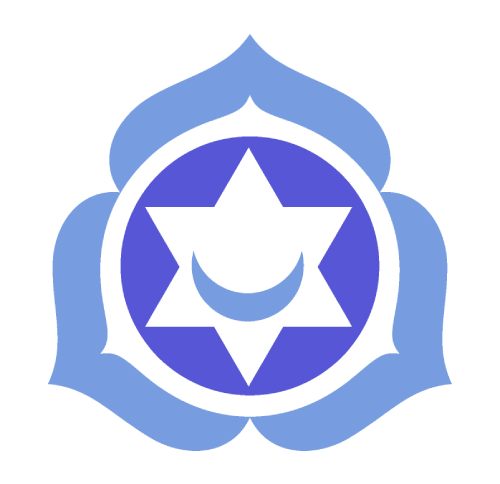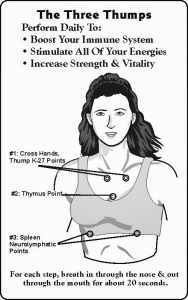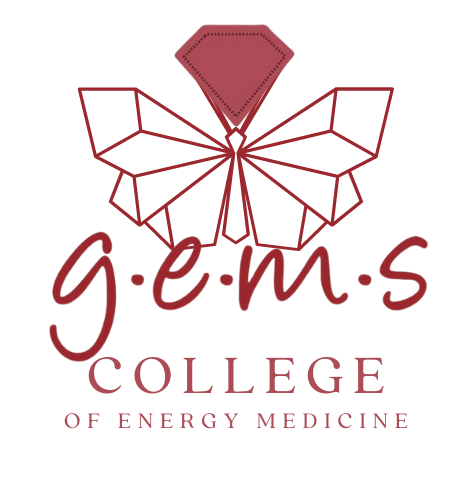
Protective Chi, the Thymus and Love
By Alexis Costello
Downloadable PDF: Protective Chi, thymus for Emergence Gathering
While organs like the brain and glands like the thyroid get all of the attention, the thymus works quietly in the background, making sure that essential services like training the immune system to combat infections and not attack your own cells takes place with minimum fuss.
Back in the days when applied kinesiology was young, there was a very popular technique called the Thymus Thump. This is supposed to wake the thymus and stimulate the maturation and release of white blood cells. And so, in a time when everyone is literally worried-sick about their immune system, I decided to begin doing this again for myself as some daily self-care.

I expressed in a blog post that I wrote when all of this began why I wasn’t all that concerned with creating formats and such for Covid-19. If our focus as practitioners is to work on people, then the issue is really about where the imbalance is within any individual that has left them open and susceptible to disease. One of the first modalities I began working with in the holistic health field was Bach Flower Remedies. Dr Bach was a medical doctor who came to the conclusion that there was more to disease and sickness than just looking at viruses. He looked around at a group of people at a party and realized that, if each of these people were given the same diagnosis they would all react in entirely different ways; some would get angry, some would become depressed, some would search desperately for a cure and others would go into complete denial. This idea gave rise to the Bach Flower Remedies, where the focus is not on the disease at all, but rather on the personality and emotions expressed by each individual.
I’m not here to talk about Flower Remedies today, but this philosophy helps us to understand the importance of the emotions and attitudes when it comes to immune system health.
Here is what allopathic medicine tells us about the thymus.
The thymus is described as the primary lymphoid organ of the immune system. We know that the thymus acts as a bit of a training ground for immune response cells, making sure that they are able to respond appropriately when stimulated. It is here that t-cells develop from precursor cells and mature. I don’t want to spend a lot of time discussing the physiology here because that’s stuff that can be found in any anatomy book. But notice this quote about thymic function: “The cells of the thymus provide for development of T cells that are functional and self-tolerant. Therefore, one of the most important roles of the thymus is the induction of central tolerance”. In physiological terms, this is a complicated mechanism that means that any cells that are reactive to the self are eliminated so that the immune system is not fighting against its own body like we see in auto-immune responses. But we could also see this is a broader and more metaphorical sense – how reactive are we and are we self-tolerant?
When I am operating from a place of extreme self-criticism and blame, I am not showing central tolerance – rather I am turning on myself. The body no longer recognizes itself, and the cells no longer recognize what is healthy. If one thinks negative, unloving thoughts about the body and oneself, how will the cells know not to similarly attack themselves? This is a theme that is echoed in the work of Louise Hay and Bruce Lipton – our thoughts matter and our thoughts about ourselves and our relationships with others impact the immune system.
“My Loving thoughts keep my immune system strong.
I am safe inside and out.
I hear myself with love.”
~ Louise L. Hay
Another clue as to the deeper nature of the thymus comes from the name itself. The name comes from the Greek ‘thumos’ meaning ‘anger’ or ‘heart, soul, desire, life’ and some philosophers and doctors thought that the soul resided here. A Biblical definition site translates it, “an outburst of passion, or wrath.” Wikipedia links it to the idea of ‘spiritedness’ (like a spirited debate), saying the word indicates a physical association with breath or blood and is also used to express the human desire for recognition. In Homer’s works, thumos was used to denote emotions, desire, or an internal urge.
Obviously there is more here than simply a training ground for lymphocytes!
If we hadn’t been speaking specifically of the thymus and I had simply read you the list of defining terms, you may have thought that I was referring to the heart. The heart is the centre that we would usually associate with these ideas of passions, desire and spirit. That these emotions are associated with the thymus tells us how much overlap there might be and how much emotional health and wellbeing might be correlated to immune health. Removal of the thymus in an infant means depletion of the t-cells in the blood and lymphoid tissue and results in a fatal wasting disease, but if this gland is removed in adults it doesn’t have much effect. There is some suggestion that the decline of the thymus is part of the aging process and that the longer that the thymus stays well, the slower the individual’s decline. It seems to be sensitive to stress, alcohol, cigarettes and drugs all of which speed the decay. Perhaps in adulthood its secondary function is more important; the thymus is not just the place where the lymphocytes mature, it is also harmonizes and controls the entire system. This might remind of of the Heart Meridian’s role in harmonizing and organizing all other function in the body.
The heart seems to play a small role in immune response. In the last ten years it has been recognized that the heart has its own innate immune system which allows it to respond to tissue injury and orchestrate homeostatic responses. There are clusters of lymphocytes in the pericardium that are activated when something goes really wrong, like when someone has a heart attack, and signaling molecules called cytokines are secreted, which recruit neutrophils (another type of immune cells) to the damaged area of the heart muscle. But the immune response being studied seems to be specific to the heart itself – the heart is not thought of as a part of the body’s overall immune system, it is simply recognized that the heart can sort of take care of itself.
In allopathic medicine the heart is relegated to being a pump for the cardiovascular system.
It’s important in that without it you will die, but it is mechanical, not imbued with any kind of special power. Conversely in TCM the Heart is referred to as the Emperor, directing and controlling basically every other aspect of the being; including the overall spirit and vitality of the person. If the heart is not ruling properly, then the other aspects of the body are not able to work in harmony and disease prevails.
According to TCM, the thymus is in the same cavity as the heart and extreme emotions, particularly grief and anger, have an immediate suppressive effect on the immune system. In Ayurvedic medicine, the chakras feed into the endocrine systems and specific nerve plexus within the body via the nadi flows and the thymus gland is fed by the heart chakra. Specifically, the Higher Heart chakra, which can be activated in order to enhance immunity but also the individual’s ability to work energetically with others. Both the Heart and the Thymus are conductors of systems within the body and the two are joined in function via the Heart chakra energy, influencing each other and working together. When you look up this energetic centre you find something called the higher-heart chakra or the thymic chakra or the soul seat or the middle tan tien depending on whose work you are reading but the descriptions all seem to be the same.
Is this provable scientifically? Not really. But when we experiment with muscle testing, we can see the connections between these systems and balance them accordingly.
What happens then, when in order to stay out of harms way of a virus, many of us are shutting down our heart centres by being afraid of others and not being able to express love for humanity? Doesn’t this push us further out of alignment? A tired and stressed Heart is no longer sustaining and directing the activity of the thymus. The immune system then is left without direction and guidance, which can put us at risk for either not noticing invaders until it is too late, allowing viruses and bacteria to gain traction in the body unchallenged, or to turn on itself; attacking the body’s own cells and creating autoimmune responses.
Having considered the physiological and emotional aspects of immunity, we might also want to consider the energetic aspect. Wei Chi is like a protective energetic shield, located in the muscles and skin and the musculotendinous meridians and extending just out from the body into the etheric layer. Our modern world is particularly hard on wei chi because our energetic fields are constantly bombarded by electromagnetic radiation from cell phones, wifi, etc. Before something harmful interacts with our physical body it goes through all of these energetic layers. According to TCM our wei chi can be affected by the actions and thoughts of others and we need to take good care of ourselves and have strong boundaries in order to keep protected. While the thoughts and emotions of others can attack our wei chi our own thoughts and emotions can, of course, affect the quality of wei chi as well.
The circulation and activation of wei chi is propelled by the energy of the lungs, which would make it part of the Metal element. The GEMS scan sheets attribute it to Wood because it is also a product of the metabolic processes of the Liver and is susceptible to emotional influence. Poor lung energy can lead to a poor defense against external pathogens and environmental factors such as wind, cold, heat, dampness, or dryness. We receive a certain amount of wei chi through our ancestral energy but maintain it through our health habits and the state of our emotions. When this energetic immune system works to protect us, we are able to resist microbes and not fall ill. We are able to work with people who are sick without catching the virus ourselves. On an energetic level, this means blocking negative energy frequencies and being less affected by other people’s energy, not allowing it to make us ill.
So if we recognize these three components as all being important factors for complete immune health on all levels, then we want to have a way of working with them as a unit and testing their integration with each other. There are formats out there to define the thymus; what I am suggesting here is to use the typical thymus format (gland mode x CV 18) along with chakra mode – this allows us to define the relationship between the thymus and the heart energy centre and see what going on here. If there is stress, this might be a good time to begin looking at different emotions in order to see what emotions are pushing the immune response into an out-of-balance state. If MM gives no IC when the gland is tested and then a change when you add the component of the heart chakra, that gives a pretty clear sign that we need to be looking at the energetic physiology of the heart centre and the thymus and not just the anatomical aspect.
Useful formats:
Thymus: Gland mode x CV 18
Thymus/heart connection – upper heart chakra: Gland Mode x CV 18 x Chakra Mode
Wei chi format: Electrical Mode x LV 1
Basically here we are asking a series of questions, checking in with the immune system, then emotional immune system, then energetic immune system, allowing us to diffuse stress and balance on several different layers of being.
Multi-layer Immunity Protocol:
- Ask permissions, do prechecks, etc.
- Use CRM to input a specific affirmation in relation to the immune system. (eg: My immune system is balanced and resilient.) PL/IC
- MM thymus: Gland mode x CV 18, PL/IC
- Use More mode or Deeper function to discover if there are additional points or information that needs to come into the circuit in order to make sense of it.
- MM Thymus/heart connection: Gland Mode x CV 18 x Chakra Mode, PL/IC
- Check for additional information, which will probably be emotional in nature. Scan Heart meridian emotion and Heart chakra attributes. Add all relevant information into circuit.
- MM Wei chi format: Electrical Mode x LV 1, PL/IC
- Check for additional information which will probably be electrical/energetic in nature. Add all relevant information in circuit.
- Permissions to correct?
- Use GEMS Flowchart or any scan sheets to determine the best correction. Can re-challenge the above formats to ensure that all stress has been removed after the correction.
Working with the immune system as a multi-layered matrix of interwoven parts allows us to work holistically – balancing all the layers of the individual rather than focusing on the disease.
Notes:
Liddell HG, Scott R. “θυμός”. A Greek-English Lexicon. Retrieved 2019-12-10.
Adv Clin Exp Med. 2016 Mar-Apr;25(2):369-75. doi: 10.17219/acem/58802.
The Thymus: A Forgotten, But Very Important Organ.
Zdrojewicz Z1, Pachura E2, Pachura P2.
THE EMERGING ROLE OF INNATE IMMUNITY IN THE HEART AND VASCULAR SYSTEM: FOR WHOM THE CELL TOLLS
Circ Res. 2011 Apr 29; 108(9): 1133–1145.
doi: 10.1161/CIRCRESAHA.110.226936
Immune cells play surprising role in heart, mouse study suggests
Immune system’s B cells appear to influence how heart develops, beats
by Julia Evangelou Strait•March 3, 2020
Tag:heart, immune, psychoneuroimmunology, thymus, wei chi

